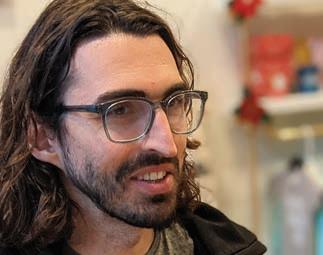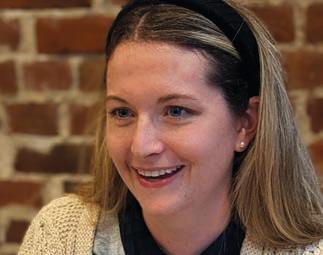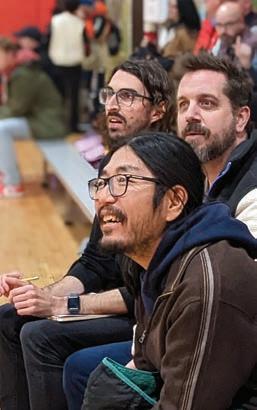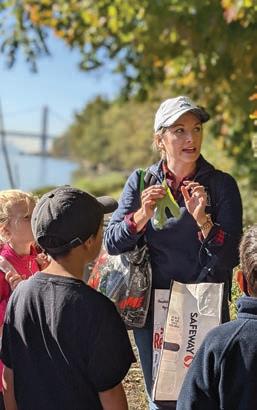
9 minute read
FACE-TO-FACE
MS. O’DOWD: Hi Sam! Thanks for interviewing with me today. Let's start with why you became a teacher.
MR. MARTINO: That’s a tricky one. I think overall education is vitally important. It’s a way for students to truly find themselves—what they’re into and where they want to go. And for me, selfishly, it’s just fun! I would not survive in a drab environment where every day was the same. In teaching, there’s always a routine and a schedule, but you never know what’s going to happen, and that keeps me on my toes. The combination of teaching being exciting for me and seeing what it can do for students when it really clicks, makes it worthwhile.
Advertisement
MS. O’D: What’s your favorite subject to teach?
MR. M: Definitely, Social Studies and History— that’s what I went to school for, I really enjoy it, and I love thinking of questions that don’t really have answers and pondering over them. Over my time at Mustard Seed, I got to teach math, too. Math was a lot of fun. I would enjoy doing that again some day; I really enjoyed teaching it. I always liked math as a student, but the thing I really put my energy into was the reading, writing, and ultimately, history.

MS. O’D: How does history in the eighth grade compare to history in the second/third grade level where you taught for years?
MR. M: It’s a big world and there is a lot of time to cover. What remains the same is the exposure to new ideas, people, and places as the main goal. The sixth, seventh, and eighth grade’s attention can really run with an idea. Their attention and focus can be sustained on something for a little longer. We can discuss big and complicated concepts. I really enjoy when students ask me questions that I am not anticipating and then the whole lesson has to pivot because we are now thinking about something else.
MS. O’D: That’s good! Got to be flexible! I know you have a degree in history and I am assuming you are an avid reader: Taking a note from the NYT’s By the Book author interviews, what is your ideal reading experience? Where do you prefer to read, what, and how? What’s the last great book you read?
MR. M: I have a strange answer. Still to this day, I like to read on trains—something about the motion, moving, and I don’t get carsick on a train. In college, sometimes I would just take a train trip to nowhere and back, just to read. A big, comfy, gigantic chair in the library is probably the next best place to be.
I mostly read non-fiction—big surprise! I challenge myself to read more fiction every year and I think I’ve fallen short. But I am always on the lookout for books—people have this image of a history textbook that's really boring with names and dates, but there are so many other interesting ways to present historical topics. I recently read a book that was just about oysters in New York City and it was fascinating! Food history is amazing. To hear about the place you live and how it used to be and what it was like, particularly through the lens of food, is really engaging and fun. It just makes me think differently about this part of the world and how I fit into it.
MS. O’D: Tying together food and books, if you were able to have a literary dinner party, what three writers, alive or dead, would you invite?

MR. M: I’d be interested in meeting Malcolm Gladwell, and the author of the oyster book, Mark Kurlansky. I’ve read several of his books and they are always about a very specific thing in a very specific place. And I would invite Shel Silverstein to even everything out.

MS. O’D: Sounds like a fun party! You are an alum of Mustard Seed and now you are here teaching. How has your background impacted your teaching?
MR. M: I have a lot of memories of what I enjoyed about my time as a student, and I have some insight into what students are feeling, what they like, what’s working, and what doesn’t work. I definitely try to approach my teaching with that in mind; thinking about what are the memories I have, what do I like to think fondly on, and how I can feed into those things or add to those experiences. I also know that I felt very prepared for high school because of the focus on reading, writing, and research. I want to continue to make sure that our students still do that to this day. It helps me to think about what was fun to be doing and academically, what we need to be doing to be successful.
MS. O’D: You are the last stop for these kids before high school. What do you think is the most important academic aspect in preparing the eighth graders for high school?
MR. M: There are two skills in particular that I want them to leave with: I want them to be really strong critical thinkers. If you are a reader and a writer, being able to work with text, analyze text, express yourself and make sense of it is essential. I also want them to have the ability to organize their own time and schedule because when they get to high school, the class environment is going to look a lot different. They are going to have more classes and teachers. The goal is that they will feel like they can take ownership of their education, in the way that is necessary to excel in high school. I want to impart on my eighth graders good work habits that they can use moving forward. Even if the class is not your favorite, you can still have habits that will get you through it and make you successful. ***
MR. M: How did you get into teaching?
MS. O’D: Believe it or not, I was one of those kids who loved school; loved my teacher, might say, teacher’s pet. My mom was a preschool teacher and still is, so for me, it was the obvious choice. When I actually got into the work, when I was in high school, I took some classes where I was out in the great schools working a little bit in the classrooms. In college, I knew it was my career path and I loved it. I love being around kids and the school routine.
MR. M: Were you always set on being a Kindergarten teacher?
MS. O’D: Kindergarten is definitely my favorite grade. I had some experiences in college in other grades. Kindergarten was always my preferred age. That five-year-old age is so fun. I love to read as well so those first building blocks of reading are so important. And they are so enthusiastic. I know we were talking about how enthusiastic kids can be. Kindergartners will always have my heart—not that I would never be open to any other grades, but Kindergarten is my favorite.
MR. M: You’ve worked at a couple of other schools. What is different about Mustard Seed? What sets it apart?
MS. O’D: I worked in a Kindergarten in Illinois. The biggest difference is support for teachers. We have a great network of directors and fellow teachers. I feel so comfortable asking any of them for help or questions. I don’t feel bad or ashamed to ask for help.
The community in the school makes a big difference, but then also the community amongst families. We talked about Advent worshiping back all together—it’s so nice to be able to welcome all the families back, too. As we walk in to sit down before worship, I’m seeing parents talk and that’s where those relationships are built. For my birthday this year, one of the parents organized a month long celebration. A different child brought me a card each day for a countdown for the month of November. The community aspect here is such a fun way to celebrate being together again.
MR. M: What does a Changemaker look like in Kindergarten?
MS. O’D: Just in our little classroom community, we make a covenant and talk about how to be a community member. Our first social studies curriculum is about performing the role of a community member. We go into depth about how our actions affect others, how others affect you, and who’s there to help you.
“I had the great pleasure of attending the 'Cindy Kuperus School of Teaching' for eight years, which is an awesome method of assimilating information. I learned a lot about how so much of what you do as a teacher is less about book learning and more about seeing children for who they are and engaging them in their own learning.
Pictured above: Mr. Martino attended every basketball game of the Rebels' extraordinary season this year. Playing the role of record-keeper, he reviewed spreadsheets of stats with the players in the morning before school the next day.
In those first six weeks, we start our baby foods service project. The kindergartners really took ownership of collecting food for the babies. They made their signs and gave announcements at worship. Many of them were scared and felt proud that they overcame their fear. They made comments like,“I helped because I could do this.” We also got to deliver the baby food at the end of the project to In Jesus Name charities and the Hoboken Community Center. We made a point to go into each of the spaces, and talk and interview the women who lead the centers. The students asked questions about the recipients and had an opportunity to see how their actions helped people in their community.
MR. M: We create a covenant in the eighth grade, too, and I think we really rely on the groundwork that you lay in the Lower School about introducing these ideas of existing in a community with others and serving and how you want your space to look.
How do you challenge a Kindergartner? What is their academic focus?
MS. O’D: The word “challenge" right now makes me think of Jacob’s Ladder. We have so many kids at different points, feeling that frustration, but their classmates will say, "Yes, you can. Keep trying, you can do it!" Sequencing, fine motor, following directions, but the biggest things is perseverance: That skill of not giving up when something is hard. Jacob's Ladder is one of the fun ways we cultivate perseverance.
We have a new literacy curriculum this school year that we are piloting in the Kindergarten. The kids were working on syllables this past week. For some it doesn’t come as easily as others. Working and seeing them get it: they are really proud! They can demonstrate their knowledge.
MR. M: How does the Reggio philosophy and responsive classroom approach come into play in your classroom?
MS. O’D: We are not as deep Reggio as the preschool, but we do practice responsive classroom. The classroom covenant, the classroom agreement, and the modeling of giving the children a chance to try something and then reteach it are both examples. We give the students a skill they can use independently and not rely on a teacher every time. Students have an opportunity to feel competent and the autonomy to solve problems on their own.

MR. M: All that social-emotional learning you cultivate in the younger grades, we really rely on and appreciate in the upper grades. They arrive with so many skills in relating to their peers. Even when things go off the rails, they are generally pretty good at resolving conflicts without requiring the adults to do it for them.
MS. O’D: The first few weeks of this school year, we read a lot of social stories together as a class covering how to be a friend, personal space, how to forgive and how to ask for something. They wrote their own stories after reading the books.
MR. M: What is a typical day for a Kindergartner?
MS. O’D: We start with worship and then they do their three work periods. They have time that they can choose space in the studio, space in the classroom, and our content is spread throughout that in blocks along with special seasonal projects. They attend teacher’s group where we are doing the new literacy curriculum, literacy work, and math workshop every day. Then they have park time to cultivate their social-emotional skills that we discuss in the classroom. Social studies and science follow lunch and quiet time. The day ends with specials and classroom jobs. There are a lot of responsibilities as a Kindergartner.
MR. M: Do you have any teaching moments or things that stand out as this is what it is all about?
MS. O’D: This is just a cute little story that happened last week. A child brought something for the sharing basket to share with the class. It was a children’s menu from a restaurant and he pointed to the drawing he made on the front and said this is me and you, Ms. O’Dowd, in a canoe. On the back, he wrote, "I love you. You’re cool."
The relationships you make with the children, that trust is essential. As a Kindergarten teacher, I could be their first connection outside of their family. I am an important person to them. They are important to me. They are able to learn from me because they totally trust me and are excited to come to school every day.






